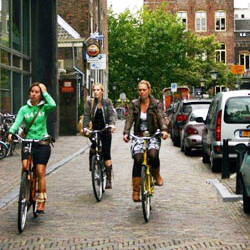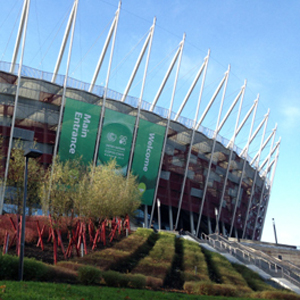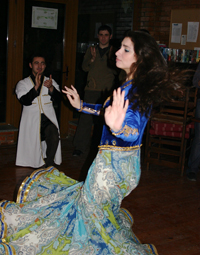 BAKU, Azerbaijan – The Azeri “bride’s” rich and ornate blue dress twirls sensually as she glides over the wooden floor. Her mysterious stare mesmerizes the onlookers, male and female alike. Her “groom”, not one to stand by as her beauty steals the show, proceeds to engage in a complex and rapid foot dance.
BAKU, Azerbaijan – The Azeri “bride’s” rich and ornate blue dress twirls sensually as she glides over the wooden floor. Her mysterious stare mesmerizes the onlookers, male and female alike. Her “groom”, not one to stand by as her beauty steals the show, proceeds to engage in a complex and rapid foot dance.
This staged folk wedding for the guests of a luxurious Caspian Sea resort in Baku reflects that Azerbaijan is a country not only rich in natural resources, but also in traditions of a people as ancient as the black gold spilling out of their sea. There are an approximate 50-55 million Azeris in the world, with up to 18 million living in Iran and less than 9 million in Azerbaijan.
For a long time locked behind the Iron Curtain, Azerbaijan became independent on October 18, 1991. Its inhabitants are rapidly opening to the opportunities the globalized world has to offer. The capital, Baku, if one believes the locals and the foreign oil investors, has seen an unprecedented economic boom in the last four years. The overall ranking report “Doing Business 2009” states that Azerbaijan jumped 64 places to 33rd out of 181 economies in 2008. Baku glows of success, its rich architecture illuminated by night, with an affluent business class flashing its new wealth in SUVs and Hummers. Thanks to its rich oil reserves, GDP growth has exceeded 20 percent in recent years, transforming Baku into a construction field, with apartment building skeletons waiting to be dressed and filled with life lining up on every piece of free land.
“The business climate in Azerbaijan has, for the most part, steadily improved over the last decade,” said Daniel Matthews, a partner at the Baker & McKenzie law firm in Baku, to Transitions Online magazine. “The new-found wealth has also enabled the government to undertake some much-needed improvements to the business climate.”
And booming business isn’t the country’s only reason for pride: Baku was declared the Islamic World’s Cultural Capital for the year 2009.
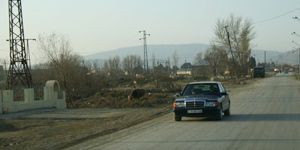 This new glow, however, clashes with the dire poverty the traveler observes right on the outskirts of the capital. A Mercedes zooming past a shepherd with his protégés is common sight just outside of the lively center. One local hotel staff reported that locals are willing to live in slums and poverty at the price of owning and showing off a Mercedes. While the fountain square in the center bustles with life, children on carousels, fur-clad women and youth on skateboards lining up at the McDonald’s, the quieter streets outside of the historical Old City bathe in a soviet-era gloom reflected in passerby’s dark clothing and serious faces.
This new glow, however, clashes with the dire poverty the traveler observes right on the outskirts of the capital. A Mercedes zooming past a shepherd with his protégés is common sight just outside of the lively center. One local hotel staff reported that locals are willing to live in slums and poverty at the price of owning and showing off a Mercedes. While the fountain square in the center bustles with life, children on carousels, fur-clad women and youth on skateboards lining up at the McDonald’s, the quieter streets outside of the historical Old City bathe in a soviet-era gloom reflected in passerby’s dark clothing and serious faces.
One cannot escape the sensation of being watched while strolling through the city. Perhaps this comes from the strict forbiddance to take pictures of the police, the Parliament or military officers.
The proximity to Russia is felt through the local elite’s “azerized” version of Russian amongst each other. Youth use the Turkish word “kontür” instead of the Russian “dziengi” to refer to telephone credit. 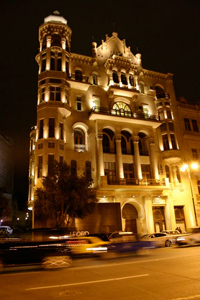 These young adults are ambitious, well educated and want to change the world. Passionate about their country, they know their history well and are keen to explain their vision of what is happening in the occupied region of Nagorno-Karabakh, particularly over a dinner table full of local specialties at the crossroads between Turkish, Russian and Central Asian traditions: lamb kabab, dolmasi and plov. The food goes down well with a splash of local beer and wine, finally polished off with sweet tea from a samovar. (A little bit of trivia: the world’s oldest samovar, aged over 3000 years, was found in Azerbaijan.)
These young adults are ambitious, well educated and want to change the world. Passionate about their country, they know their history well and are keen to explain their vision of what is happening in the occupied region of Nagorno-Karabakh, particularly over a dinner table full of local specialties at the crossroads between Turkish, Russian and Central Asian traditions: lamb kabab, dolmasi and plov. The food goes down well with a splash of local beer and wine, finally polished off with sweet tea from a samovar. (A little bit of trivia: the world’s oldest samovar, aged over 3000 years, was found in Azerbaijan.)
Before getting up to dance the energy away with the locals to Azeri pop, a traditional dinner in a local restaurant is incomplete without the burning of the uzarlik plant to ward off the “evil eye”. As the waiter swirls the smoke dish over the patrons’ heads, they are sure to forget all their sorrows and angers or any soviet past, for that matter…
As the moon glows over the Caspian Sea, indulging in the rich Azeri culture is all there is left to do in Baku.
CR

